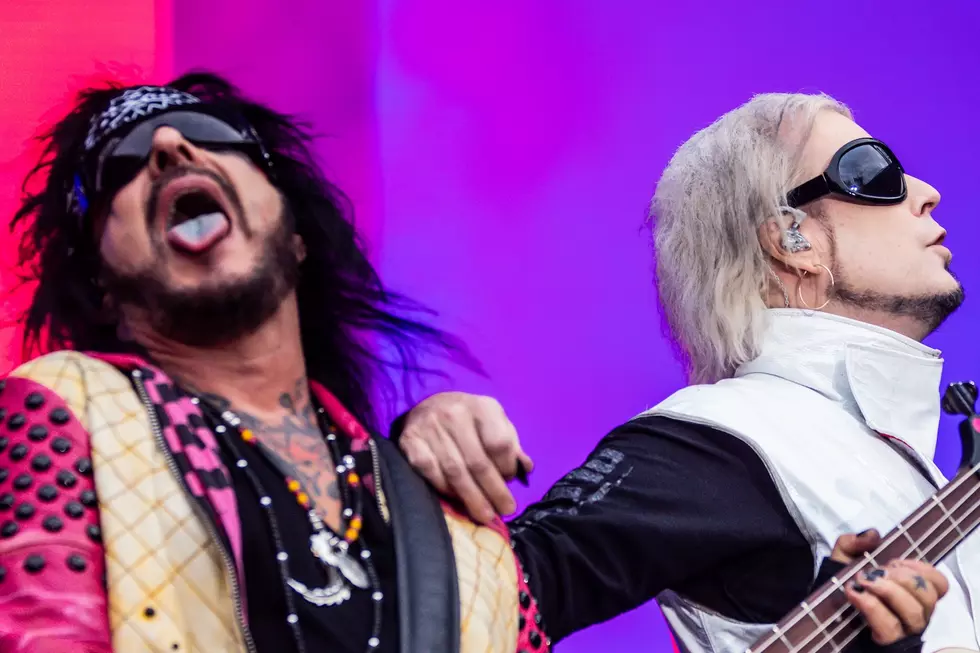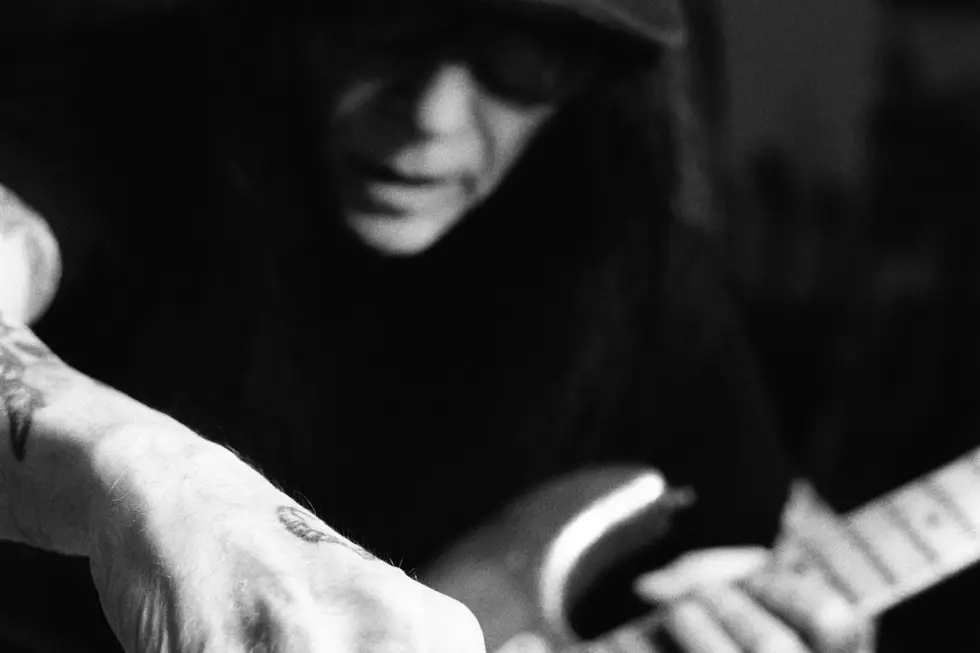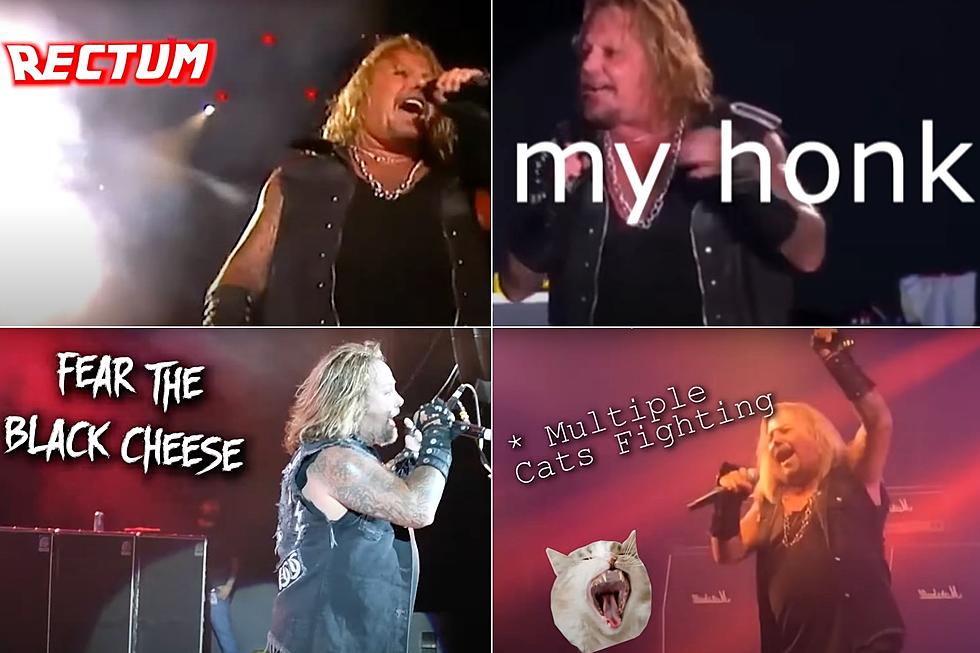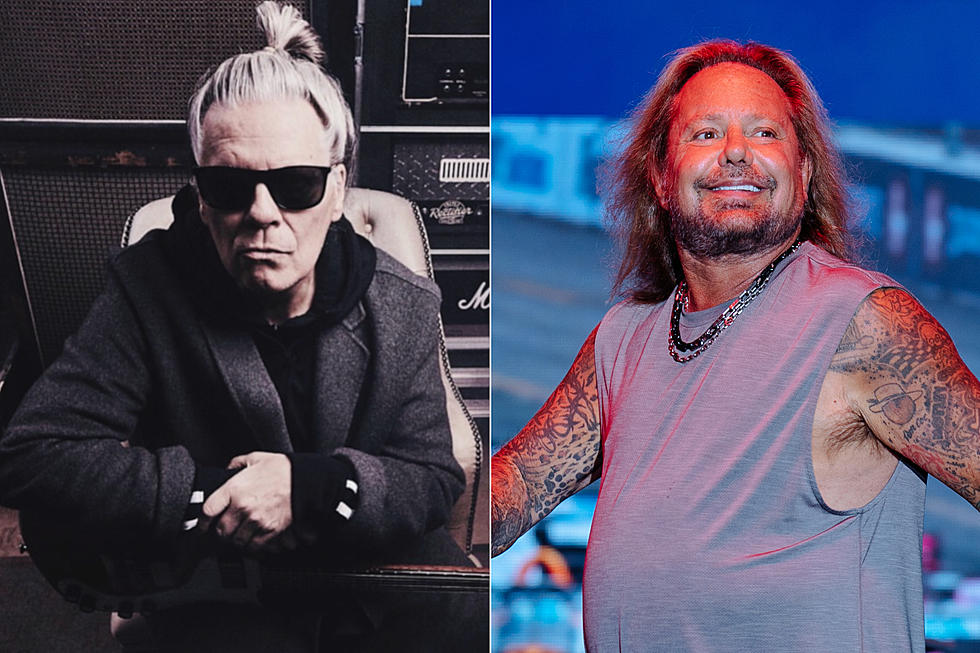
The Crazy Tale of Motley Crue’s Abandoned ‘Personality #9′ Album
Even by Motley Crue standards, the story of their abandoned second album with singer John Corabi is a wild one.
"I was losing my hair, I was a nervous wreck, my stomach was just in a knot constantly," Corabi said before he was dismissed from the band near the end of the sessions for what was supposed to be the band's seventh album, Personality #9.
"They were driving me crazy," he recalled on Rock Talk With Mitch Lafon. "So when they told me that Vince [Neil] was coming back, I was devastated but relieved at the same time."
After the band split with founding singer Neil in 1992, it recruited Corabi as his replacement and released a 1994 self-titled album that was mostly ignored by fans. Poor ticket sales for the accompanying tour forced the band to downgrade from arenas to theaters and sometimes even clubs.
Undaunted, the group began work on a comeback soon after the end of the tour. "The plan was to return to our roots with a raw, straight-ahead rock 'n' roll record," Corabi explained in Motley Crue's 2002 autobiography, The Dirt. "We started writing songs with Bob Rock (who produced 1989's Dr. Feelgood and 1994's Motley Crue) called 'The Year I Lived in a Day' and 'La Dolce Vita,' and at the end of each day we'd walk around carrying our huge cocks in our hands because the music rocked so hard."
Listen to Motley Crue's 'Let Us Prey' With John Corabi
But the band's commercial free fall caught the attention of Elektra Records and its parent company, Warner Music. Just a few years earlier, the label had signed Motley Crue to one of the most lucrative record contracts in history and were now due to pony up $4.5 million for them to record a follow-up to Motley Crue, which didn't even reach platinum.
Before cutting that massive check, Elektra flew the band members to New York City for what bassist and primary songwriter Nikki Sixx thought would be a pep talk. "After all the millions of dollars we had generated for his company, this was the first time they had ever treated us with respect," he recalled in The Dirt.
Instead, the private limos and trip on the corporate jet brought the band to Warner Music CEO Doug Morris' office, where the angry exec attempted to order them to reunite with Neil. "We were thinking about what we should do," Sixx recalled Morris saying. "And what we should do is get rid of the guy who's not a star. Call the old guy. Bring him back. Everybody will love that."
Sixx and drummer Tommy Lee tried to convince Morris that Corabi was the better frontman for Motley Crue in the '90s, especially given the recent chart dominance of more serious acts like Nirvana, Pearl Jam and Soundgarden. "We are done with this," Morris replied curtly. "This is bullshit."
Just as Sixx was revving up a profanity-laden "We don't need you" speech, recently appointed Elektra boss Sylvia Rhone intervened and backed the band. "They are great just as they are," she declared. "They are very current with John." Morris backed off, but new Motley Crue manager Allen Kovac smelled a rat, suspecting Rhone was setting up the band to fail so she could use the losses as a tax write-off.
According to Sixx, almost immediately after pledging her full support to the band, Rhone began "trying to squeeze and demoralize" them, sending money only occasionally. Forced to cut corners, Sixx and Lee fired Rock and decided to produce the record at the drummer's home studio with help from Dr. Feelgood engineer Scott Humphrey. Problem was the duo's grandiose aspirations for the album were matched by their wildly differing and changing views on how it should sound.
"I don't know why, but Tommy and Nikki thought that they would be able to produce the next record themselves, which I think was a massive, massive mistake," Corabi told Lafon in 2018. In retrospect, Sixx agreed. "What we needed was someone to tell us we were fooling ourselves trying to make some sort of electro-grunge record with Corabi," he stated in The Dirt. "But that someone wasn't Scott Humphrey."
In the 2018 Rock Talk interview, Corabi described how unbearable things became as he tried to appease three separate producers, none of whom were able to explain exactly what they wanted him to do.
"I would sing something, and it was, like, 'Ehh ... it's a little too bluesy.' Well, newsflash: I'm a bluesy singer, you knew this," he said. "So then I'd have Nikki on one side interjecting, 'Well, Crab, I love what you're doing, but it's not really what I'm hearing in my head.' ... And then he would give me, like, Manic Street Preachers, Sisters of Mercy meets David Bowie. And then Tommy would go, 'Yeah, but heavy, dude, like Pantera, but lush and melodic like Oasis.' And then Scott would go, 'Or Cheap Trick.' I had no concept of what they were talking about. Where Bob Rock, he would be way more pinpoint-exact, like, 'Here's what I'm talking about.' And if I still didn't understand it, he would sing it to me. 'Oh, okay. Totally understand what you mean.' Yes — boom! And I would go in and do what I had to do. So, I was kind of struggling."
In a particularly self-incriminating passage in The Dirt, Sixx admitted the burden they placed on the singer during the Personality #9 sessions was unfair. "Corabi was being treated like a criminal who had stolen our careers," he noted. "Every day, we'd take all our frustrations out on him, we'd tell him he needed to cut his hair or that he needed to sing in a completely different style. And every week we'd change our minds about everything."
Founding guitarist Mick Mars was similarly marginalized, with Humphrey reportedly criticizing his playing and replacing it behind his back with tracks performed by Sixx and Corabi. "So for the first time in our careers, we started to turn against Mick [and] to think that he was the one holding us back because he thought that blues and classic rock were the only genres of music that mattered," Sixx recalled.
Mars started calling Humphreys "the Great Invalidator" and pondered quitting the band. "Every sound I ever brought in on guitar was greeted with a chorus of 'nope, nope, nope, nope,'" he said in The Dirt. "How many times do you have to start to hear 'no' before you start believing it yourself? I've never been so upset during my entire time with the band."
Humphreys insisted in The Dirt that it was actually Lee and Sixx who were railroading Mars: "It's funny that [Mars] would remember me being the guy who didn't want his guitar parts, because I wanted to make a Motley Crue record that sounded like the early stuff."
Everything came to a head after a rare happy moment in the studio, when Corabi said Lee praised him for coming up with the guitar chords to complete the song "Confessions." "I turned around and cracked, 'Maybe I should just be a fucking guitar player then. At least I can do that right in your eyes.'"
That turned out to be the opening the pro-Neil reunion supporters needed. "There was some talk that Vince was coming back, but it was kind of brushed aside," Corabi told Heavy Magazine. "But I went to rehearsal one day, and when I walked in and saw the managers and the lawyers, I'm like, 'Uh-oh, this isn't gonna be good.' And that's when they told me. A lot of people don't realize that I was in the band five years, and they basically said, 'Hey, man, thanks for all your efforts and everything, we love you, but the record label just isn't gonna support this version of the band.' I just said, 'Okay, cool,' and out the door I went."
The idea of keeping Corabi on as a second guitarist was briefly floated but eventually abandoned. Still, the band decided to salvage some of the Personality #9 tracks by erasing Corabi's vocals and replacing them with new ones sung by Neil.
That immediately set off another landmine: Neil hated the material and still hadn't forgiven his bandmates for firing him in the first place. "A week or so later, as I listened to some of the instrumental tracks for the new album, Generation Swine, I was not so sure I'd done the right thing. Fuck! I knew it. I'd made a big fucking mistake!" Neil recalled in his book Tattoos & Tequila. "All the old feelings resurfaced; my skin crawled. I hated everybody from the jump. And I hated all the songs. The songs sucked. Period."
Despite Neil's concerns that the tracks were a poor fit for his voice, Motley Crue cobbled together Generation Swine. To help carry the load, Lee and Sixx each took vocals on a track, and the band recorded a new version of their 1983 hit "Shout at the Devil."
"There's a lot on that album that I'd have changed had I been there from the start," Neil told Classic Rock in 2000. "I didn't think the producer really knew what he was doing, because he wouldn't let me sing in the style I was accustomed to. He wouldn't let Mick play his usual way either. It was a nightmare."
Generation Swine was released on June 24, 1997. It entered the album chart at No. 4 but quickly faded and, like its predecessor, died before it could sell a million copies. Still, the band's reunion tour in support of the LP did good business. "The whole album sucked," Neil declared in Tattoos & Tequila. "The sales were totally out of loyalty from our fans."
Even after his dismissal, Corabi returned to the studio to contribute additional guitar parts for Generation Swine and to show Neil how to sing the bonus track "Kiss the Sky." In July 1997, he sued Motley Crue for $4 million, alleging that he had contributed to "at least 80 percent" of the music on the album while receiving credit for only two songs.
Still, he has maintained mostly friendly relationships with his former bandmates, performing with Sixx in the Brides of Destruction on 2004's Here Come the Brides and participated in both The Dirt and Tommy Lee's Tommyland book. In 2016, Corabi said he was contributing tracks to Mars' still-unreleased debut solo album. He also posed for a friendly photo with Neil.
The band has excluded the Corabi-fronted Motley Crue album from its otherwise complete catalog reissue campaigns in recent years, so the odds of an official release of the Personality #9 tracks seems remote. So far, only two songs from the sessions have leaked: an early version of the Generation Swine song "Let Us Prey" featuring Corabi on vocals and the melancholy "Say Goodbye."
Listen to Motley Crue's 'Say Goodbye' Demo
Looking back on his Personality #9 experience in The Dirt, Corabi said he wished he'd spoken up and shared his opinion more. "Most importantly, I would tell them what I really wanted to tell them at the time but never had the balls to," concluded one chapter. "I was too scared of getting fired, so I kept my mouth shut and never spoke these five words that were burning a hole through my lips."
The next chapter consists of only five words: "Make your fucking minds up!"
Motley Crue Lineup Changes: A Complete Guide
More From Ultimate Classic Rock









